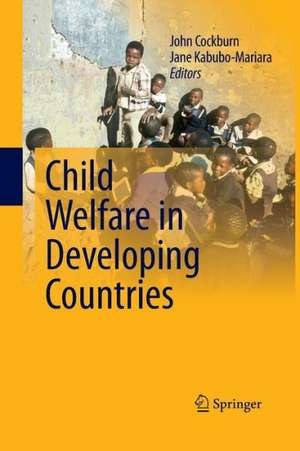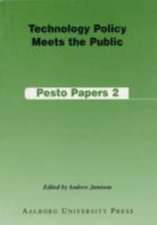Child Welfare in Developing Countries
Editat de John Cockburn, Jane Kabubo-Mariaraen Limba Engleză Paperback – 20 oct 2014
| Toate formatele și edițiile | Preț | Express |
|---|---|---|
| Paperback (1) | 641.03 lei 6-8 săpt. | |
| Springer – 20 oct 2014 | 641.03 lei 6-8 săpt. | |
| Hardback (1) | 647.40 lei 6-8 săpt. | |
| Springer – 5 aug 2010 | 647.40 lei 6-8 săpt. |
Preț: 641.03 lei
Preț vechi: 754.15 lei
-15% Nou
Puncte Express: 962
Preț estimativ în valută:
122.67€ • 128.99$ • 101.35£
122.67€ • 128.99$ • 101.35£
Carte tipărită la comandă
Livrare economică 17 aprilie-01 mai
Preluare comenzi: 021 569.72.76
Specificații
ISBN-13: 9781489997029
ISBN-10: 1489997024
Pagini: 308
Ilustrații: X, 298 p.
Dimensiuni: 155 x 235 x 16 mm
Greutate: 0.44 kg
Ediția:2010
Editura: Springer
Colecția Springer
Locul publicării:New York, NY, United States
ISBN-10: 1489997024
Pagini: 308
Ilustrații: X, 298 p.
Dimensiuni: 155 x 235 x 16 mm
Greutate: 0.44 kg
Ediția:2010
Editura: Springer
Colecția Springer
Locul publicării:New York, NY, United States
Public țintă
Professional/practitionerCuprins
Child Welfare in Developing Countries: An Introduction.- Child Welfare in Developing Countries: An Introduction.- Multidimensional Child Poverty Analysis.- Multidimensional Poverty, Survival and Inequality Among Kenyan Children.- Profiling Child Poverty in Four WAEMU Countries: A Comparative Analysis Based on the Multidimensional Poverty Approach.- Multidimensional Poverty AmongWest African Children: Testing for Robust Poverty Comparisons.- Impact Evaluation.- Free Primary Education in Kenya: An Impact Evaluation Using Propensity Score Methods.- Productive Safety Net Program and Children’s Time Use Between Work and Schooling in Ethiopia.- Family Allowances and Child School Attendance: An Ex-ante Evaluation of Alternative Schemes in Uruguay.- The Impact of the Increase in Food Prices on Child Poverty and the Policy Response in Mali.
Textul de pe ultima copertă
What factors affect child welfare? How can policy improve child welfare? In developing countries, there has been relatively little empirical work on the analysis and measurement of child poverty. Further, poverty has many dimensions, including mortality, morbidity, hunger, illiteracy, lack of fixed housing and lack of resources, and cannot be assessed with a single measurement method. Based on original research in Africa and South America, and using a multidimensional poverty indicator approach, this book identifies the existence of inequalities in child welfare, analyzes their sources, and evaluates the impacts of policy responses to those inequalities. Topics considered include monetary poverty, asset poverty, nutrition, mortality, access to education and school attendance, child labor and access to health services. The book’s findings demonstrate that while current government programs offering financial assistance, supplementary food, and free or subsidized education and health care have a positive impact on child welfare, these outcomes can still improve, and proposes policy prescriptions towards this end. The book will be of use to poverty and policy researchers, professionals in international development, and graduate students interested in poverty and inequality.
Caracteristici
Co-published with the International Development Research Centre (IDRC) Features contributions from local researchers in Africa and South America One of few books to offer empirical analysis and measurement of child poverty















